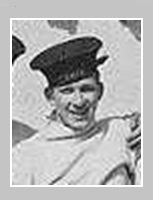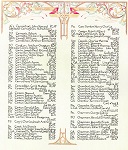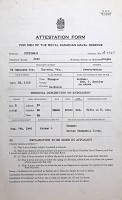|
They made the Ultimate Sacrifice
ARMSTRONG, Frederick Thomas, AB, V61371, RCNVR, MPK - 09 Jun 1944, MTB-464 - Son of Frederic James and Sarah Armstrong, of Utterson, ON.
AB Frederick Armstrong was killed in action on 09 Jun 1944 when his MTB was hit by shellfire from German E-boats. Armstrong Cape, Nunavet was named after Frederick Armstrong.
Gordon William Armstrong, V49241, RCNVR was serving in HMCS RESTIGOUCHE when his brother, AB Frederick Armstrong was killed in action.
Citation of Mentioned in Despatches:
ARMSTRONG, Frederick Thomas, Acting Able Seaman, V51371, Posthumous Mention in Despatches, RCNVR - Awarded as per Canada Gazette 20 January 1945 and London Gazette of 29 August 1944.
"For gallantry, skill, determination and undaunted devotion to duty during the initial landings of Allied Forces on the coast of Normandy."
The following 3 articles describe the action in which AB Frederick Armstrong was killed.
June 8, 1944 Boats 459,460,465 and 466 returned to Portsmouth for a night's rest. The others - 461, 462 462, 463 and 464 - were on patrol in the central part of Tunney South, and had chased some E-boats which outran them to the west. Coming back onto station at a little after two a.m., they stopped engines and began a 'listening watch' by hydrophone. They had been 'silent and stopped' in the dark for a little less than half an hour when, once again, the two Elbings loomed suddenly in front of them, not five hundred yards off. Having other preoccupations the German destroyers had not sighted the M.T.B.'s; they were apparently just getting into position to bombard the assault anchorage. Fired a minute or so later, their first 'starshells', passed above their heads of the Canadians to burst over the line of ships before the beaches. The M.T.B.'s started their engines slowly, and cautiously hoping to remain unobserved. They were scarcely under way, however, when the German ships turned on them, and opened with rapid and accurate salvoes that kept them dodging through a smoke screen for ten minutes. Boat 464, stationed astern and making smoke for the others, took the brunt of the action. One of its men was killed and another seriously injured; but once again, a projected attack on the ships at anchor had been broken up.
2. Official Account, quoted in: Holding Juno: Canada's Heroic Defence of the D-Day Beaches: June 7-12, 1944. MARK ZUEHLKE. 2005. Douglas & McIntyre, Toronto. pp. 214-215.
Although illuminated by the star shell, the MTBS were not immediately fired upon - leading to the suspicion that the intent had been to light up the beaches in preparation for a bombardment. The destroyers were just five hundred yards from the MTBS, which were drifting silently on the flat sea. Burk ordered motors started and crept along in the destroyers' wake, shadowing their position in the hope of directing other MLES or destroyers fitted with torpedo launchers against the German vessels, "But before they had more than got underway the enemy opened file with rapid and accurate salvos for about ten minutes, [until] the MTBs were able to disengage under cover of smoke, MTB 464 took the brunt of the fire since [its] smoke was covering the others and one of [the] gunners, [Frederick T. Armstrong] was killed while another crewman was seriously wounded in the back. All boats sustained slight damage but no other casualties, due mainly to the effectiveness of the smokescreen and the evasive tactics of the senior officer. Although it was impossible to claim more than a few hits on the enemy by pom-pom and Oerlikon, the enemy bad again been successfully reported and stopped from attacking the anchorage” concluded an official report on the action.
3. The Diary of a Proud Canadian Sailor - by Real Joseph DeGuire V.61809 - Mess 2, H.M.C.S. ALGONQUIN ( http://jproc.ca/r17/deguire.html )
Suddenly, orders reached the bridge but before I go into details other things happened. Paratroops were being landed by the thousands. It was good to see them float through the air. One thing that made me happy was to have the MTB 459 (Motor Torpedo Boat) tied up alongside. Her crew was Canadian and one of my friends, Seaton, came aboard. I learned great things from him. Armstrong, another friend of mine on the MTB 464, was killed. He got an Oerlikon shell through the chest. He was the only Canadian Naval casualty of the opening of the second Front. Red Nichols was on her when they attacked three German destroyers. MTB life is pretty grim but they have nice quarters.
Submitted by Brian Molyneaux
Ships served in: HMCS YORK - Enlisted 18 May 1943 * Commenced Active Service 28 May 1943 as an Ordinary Seaman, RCNVR HMCS PROTECTOR II - Drafted to PROTECTOR II 03 Jun 1943 HMCS CORNWALLIS - Drafted to CORNWALLIS 21 Jul 1943 HMCS STADACONA - Drafted to STADACONA 30 Oct 1943 HMCS NIOBE - Drafted to NIOBE 15 Dec 1943 HMS MANTIS - Drafted to MANTIS 16 Jan 1944 HM ML Q593 (Royal Navy Motor Launch) - Drafted to Q593 27 Feb 1944 HMCS NIOBE - Drafted to NIOBE 29 Mar 1944 MTB-464 - Drafted to MTB-464 12 May 1944 * Rated Acting Able Seaman, RCNVR 28 May 1944
Service file for Frederick Armstrong Source: The Library and Archives of Canada
Second World War Casualty Index
|



